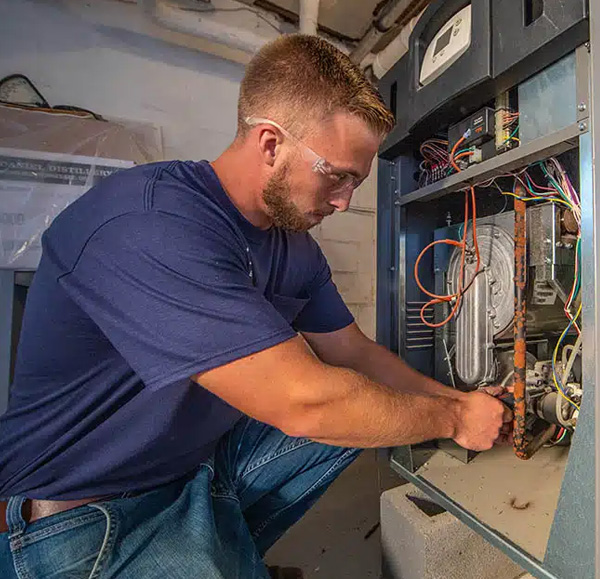Murray Heating and Cooling The Heart of Your Home’s Comfort
Most people know that a gas furnace keeps their home warm, but its role in maintaining year-round indoor comfort often goes overlooked.
Gas furnaces do more than just heat; they’re the backbone of an efficient HVAC system. With a powerful, centralized blower, they circulate air throughout your home, creating the foundation for a complete comfort solution. Pair your furnace with components like an air conditioner, heat pump, whole-home air purifier, humidifier, UV germicidal lights, or fresh air ventilation to achieve enhanced comfort and improved indoor air quality.
By understanding how gas furnaces work and selecting the right one for your needs, you’ll enjoy years of dependable performance and a more comfortable home. Let Murray Heating and Cooling help you create the perfect system for your comfort.

Choosing the Best Gas Furnace
Selecting the right gas furnace for your home involves several factors. From fuel type to efficiency ratings, here’s what to consider when making your choice.
Fuel Source Options
Furnaces come in various types based on fuel, including natural gas, propane, oil, and electric models. If your home uses natural gas, here are key points to guide your decision:
Budget Considerations
Your budget will heavily influence your choice. ENERGY STAR® certified models, like the Infinity® 98 Gas Furnace with Greenspeed® Intelligence, offer exceptional efficiency and comfort-enhancing features, delivering long-term savings on energy bills. However, these high-efficiency models often come with a higher upfront cost compared to basic models, such as the Comfort™ 96 Gas Furnace, which meets minimum efficiency standards.
Opting for the highest efficiency model within your budget could also make you eligible for rebates or tax credits, potentially offsetting the initial cost.
Quality and Reliability
Investing in a furnace from a reputable manufacturer can pay off in the long run. High-quality units are typically more reliable and have a longer lifespan. For example, Carrier gas furnaces undergo rigorous factory testing—every single unit is run-tested to ensure it meets strict performance and reliability standards before leaving the facility.
Research and Reviews
Customer reviews and recommendations can provide valuable insight into the performance and durability of different furnace models and brands. Look for feedback from trusted sources, including online reviews and suggestions from family, friends, or neighbors who have experience with specific systems.
Professional Guidance
To ensure the furnace you choose is the right fit for your home, consult a trusted local HVAC professional. They can assess your home’s heating requirements and provide tailored recommendations to maximize comfort and efficiency.
By balancing budget, quality, and expert advice, you’ll find a gas furnace that provides dependable warmth for years to come.
What Are the Three Types of Gas Furnaces?
Gas furnaces come in three main types, each offering different levels of performance and efficiency:
- Single-Stage Furnaces:
- Operate at full capacity or not at all.
- Tend to cause noticeable temperature swings.
- Typically the most affordable but less efficient.
- Two-Stage Furnaces:
- Offer two heat output levels (high and low).
- Operate on the lower setting most of the time, reducing temperature fluctuations and improving energy efficiency.
- Modulating Furnaces:
- Adjust heat output and airflow in small increments to maintain a consistent indoor temperature.
- Provide superior comfort and are highly efficient, featuring AFUE ratings of 97% or higher.
Choosing the right type of furnace depends on your budget and comfort preferences.

How Does a Gas Furnace Work?
A gas furnace heats your home differently than a heat pump. While heat pumps transfer heat energy from the outside air to your indoor space, gas furnaces generate heat through combustion. This makes them an excellent choice for maintaining comfort when outdoor temperatures plummet—conditions where traditional air-source heat pumps can lose efficiency.
Here’s how a gas furnace works:
- Combustion Process: Natural/ Propane gas flows into the furnace and burns in a sealed chamber.
- Heat Transfer: The heat from combustion warms a metal component called the heat exchanger.
- Air Circulation: A powerful fan draws cool air from your home, blows it over the heated exchanger, and circulates the warmed air back through your ductwork to create a cozy environment.
Modern natural gas furnaces are designed for exceptional energy efficiency, measured by AFUE (Annual Fuel Utilization Efficiency). AFUE indicates what percentage of the natural gas consumed is converted into usable heat.
- Standard Efficiency: The minimum AFUE for today’s gas furnaces is 95%.
- High Efficiency: Premium models, like the Carrier® Infinity® 98 Gas Furnace with Greenspeed® Intelligence, achieve up to 98.5% AFUE by incorporating advanced components like variable-speed motors, smart control systems, and multi-stage gas valves.
With these innovations, a gas furnace provides reliable and efficient warmth, keeping your home comfortable even in the coldest weather.
.

